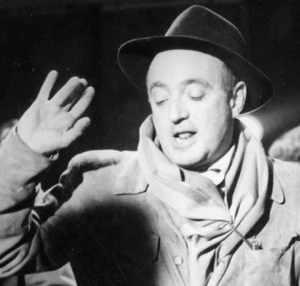Gallery
All Pictures (3)Biography
In 1928, Ophüls went to Breslau"s Vereinigte Theater. In January 1931, he moved to Berlin and directed boulevard plays at Komödienhaus. Still in 1931, Ophüls became a dialogue director for Ufa. In August of the same year, he finished his first movie, "Dann schon lieber Lebertran" ("I"d Rather Have Cod Liver Oil"), a short feature film based on a story by Erich Kästner.
Ophüls then finished his first full-length feature film in early 1932, "Die verliebte Firma" ("The Company’s in Love"), a musical comedy about film making. In August of the same year, it was announced in the press that Ophüls would direct the film version of "Liebelei" – this film version of Arthur Schnitzler"s play became his most successful movie ever.
After the film"s premiere on March 16, 1933, Ophüls left Berlin and went into exile in France, after a short stay in Saarbrücken. His father"s business in Saarbrücken was "Aryanized" after the Saar election on January 13, 1935, and Ophüls" parents emigrated to France. When Ophüls arrived in Paris, movie theatres showed his film "Liebelei" with French subtitles. The film"s success facilitated his new start in exile.
In 1934, publisher Angelo Rizzoli brought Ophüls Rome to direct "La Signora di tutti" ("Everybody"s Woman"), Rizzoli"s first movie production. Back in France, he directed two films with actress Simone Berriau in 1935: "Divine", based on the novel "L"Envers du Music-hall" by Colette, and "La tendre ennemie" ("The Tender Enemy"), based on the play by André-Paul Antoine.
In 1936, Ophüls accepted an invitation to the Soviet Union. Together with his family, he went to Moscow to shoot a Russian film that was already planned. However, he returned to Paris after two months without having accomplished anything.
Ophüls finished his next four films back in France. All films were produced by German emigrants. Ophüls, a French citizen since 1938, became a soldier for Tirailleurs Algérien in 1940. With permission from the Ministère d"Information, Ophüls was able to work for anti-fascist radio broadcasts. After the ceasefire agreement in June 1940, Ophüls who was on Gestapo"s extradition list fled to the unoccupied south of France with his family. In Aix-en-Province, he arranged for the emigration to the USA. When the procuring of the necessary documents took longer than expected, Ophüls accepted an invitation of Zürich"s Schauspielhaus.
In August 1941, the Ophüls family finally arrived in the USA. In summer of 1942, Ophüls worked for a short time in New York for the radio station Voice of America that made broadcasts to Europe during the war. In Hollywood, he wrote several treatments to anti-Nazi films but the films were not realized. His was also luckless with his other film projects during that time. It was not until the fall of 1944 after a private screening of "Liebelei" that Ophüls was hired by Preston Sturges to direct "Vendetta". The preparations for the film nearly took two years. During this time, Ophüls wrote his autobiography that was published posthumously in 1959 under the title "Spiel im Dasein".
In August 1946, the shooting of "Vendetta" finally began but Sturges stripped Ophüls from the post of director after only a few days. After this debacle, Robert Siodmak mediated a contract for Ophüls in October 1946 to direct "The Exile", starring Douglas Fairbanks Jr. Screenplay writer Howard Koch then recommended Ophüls as the director for "Letter From an Unknown Woman". Producer William Dozier and his wife Joan Fontaine had wished to turn Stefan Zweig"s "Brief einer Unbekannten" into a film for a long time. Again, "Liebelei" was a decisive factor in hiring Ophüls.
After a film project with Greta Garbo did not come into being, Ophüls stayed in Paris and directed "La ronde" ("Roundabout"). When the scandal around the film turned into a success, Ophüls received further offers for juicy episode films and directed "Le Plaisir" ("Pleasure"), based on three stories by Maupassant. After finishing two episodes, the production went bankrupt and producer Harispuru financed the film"s completion.
In summer of 1954, Ophüls accepted the offer to direct "Lola Montès", a French-German production in color and in CinemaScope, with Martine Carol, a 1950s sex symbol, in the title role. The film"s premiere in Paris in 1955 turned into a scandal. The by then most expensive film of post-war European cinema became a spectacular flop. However, the staff of Cahiers du Cinéma, with François Truffaut at the helm, enthusiastically defended "Lola Montès" and praised the film as work of the avant-garde and of the auteur cinema.
Back in West Germany, Ophüls again worked for radio stations. In the summer of 1956, he and Henri Jeanson wrote the screenplay to a film about the painter Modigliani that was supposed to be filmed in the fall of 1956, but the production date was postponed. Ophüls then directed his own adaptation of Beaumarchais’ "Der tolle Tag" ("The Marriage of Figaro") at Hamburg#s Deutsches Schauspielhaus under artistic director Gustaf Gründgens and celebrated a huge success. On the day of the premiere, January 5, 1957, Ophüls was ill and stayed in his hotel room. Max Ophüls died on March 26, 1957, from a rheumatic cardiac inflammation at Katholisches Marienkrankenhaus in Hamburg-Hohenfelde.
